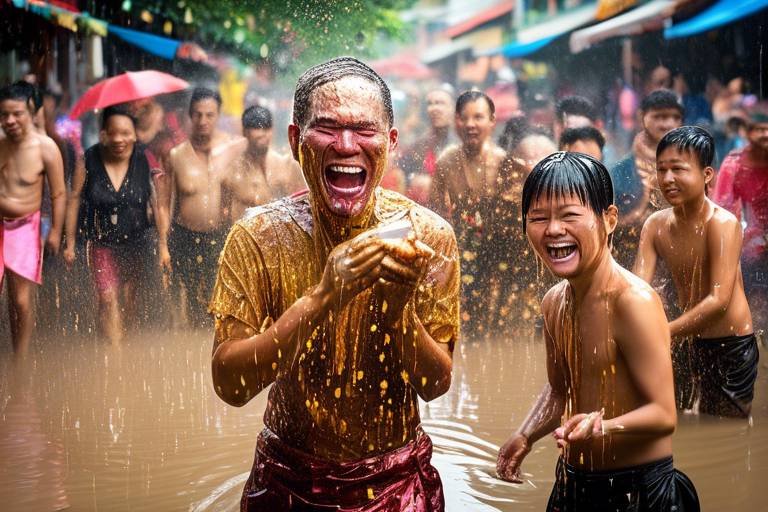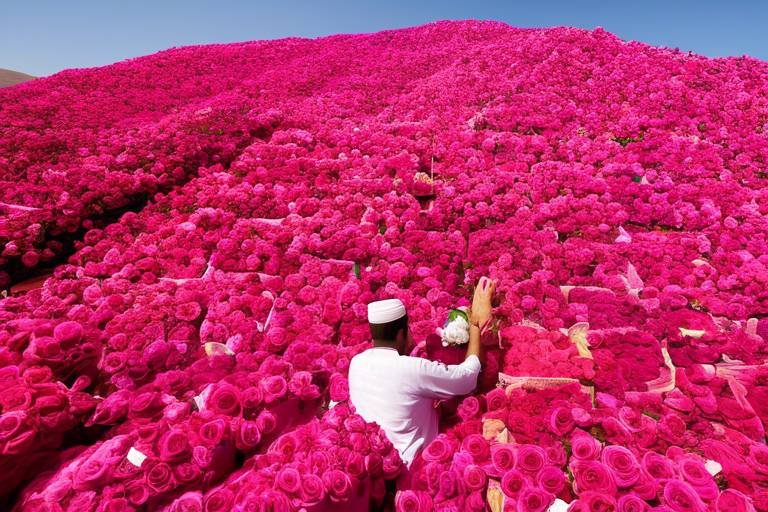The Cultural Heritage of Thailand's Songkran Festival
The Songkran Festival in Thailand is not just any ordinary celebration; it is a vibrant tapestry woven with cultural threads that date back centuries. This annual event, marking the Thai New Year, is a time when tradition and modernity collide in a spectacular explosion of color and joy. As water splashes and laughter fills the air, Songkran showcases the heart and soul of Thailand's rich cultural heritage, inviting both locals and visitors to partake in its unique customs and rituals.

Origins and History
The Songkran Festival, one of Thailand's most revered celebrations, has deep roots that intertwine with the country's rich cultural heritage. Originating from ancient Brahmanic and Buddhist traditions, Songkran has evolved over centuries to become a significant event marking the Thai New Year. The festival's history is a tapestry of rituals, beliefs, and community practices that reflect the essence of Thai identity and spirituality.

Water Festival Traditions
The during Thailand's Songkran Festival are a captivating display of joy and symbolism. This integral aspect of the celebration revolves around the cleansing and renewal properties of water, embodying a deeper cultural significance. The water-related customs observed during Songkran serve as a symbol of purification and the washing away of sins and bad luck, preparing individuals for a fresh start in the Thai New Year. Participants engage in playful water fights and ritualistic cleansing ceremonies, creating a lively and vibrant atmosphere across the country.

Symbolism of Water
The in the Songkran Festival holds deep cultural and spiritual significance in Thai tradition. Water is not merely a tool for fun and refreshment during this festive time; it symbolizes purification, renewal, and the washing away of sins and bad luck. Imagine the act of splashing water on others not just as a playful gesture but as a ritualistic cleansing of the past year's negativity. It's like hitting the reset button, giving everyone a chance to start afresh.

Religious Ceremonies
Religious ceremonies hold a significant place in the annual Songkran Festival, reflecting the spiritual essence of the event. During Songkran, Thai people engage in various religious practices that honor their beliefs and traditions. One of the central aspects of these ceremonies is the temple visits, where individuals pay respects to the monks and participate in chanting and meditation sessions. These visits serve as a way to seek blessings for the upcoming year and express gratitude for the past.
Merit-making activities are also an integral part of the religious ceremonies during Songkran. People partake in acts of generosity, such as offering food to monks, donating to temples, and releasing animals as a symbol of compassion. These practices are believed to bring good karma and blessings, fostering a sense of community and interconnectedness among the participants.
Another ritual observed during Songkran is the pouring of scented water on Buddha images. This symbolic gesture signifies the act of purification and renewal, cleansing the spirit and inviting positive energy into one's life. The fragrant water is often mixed with flower petals and herbs, creating a serene atmosphere that enhances the spiritual experience for the worshippers.
Furthermore, Songkran provides an opportunity for individuals to reflect on their actions and seek forgiveness for any wrongdoings. The act of water splashing, a common sight during the festival, is not merely a playful gesture but a form of spiritual cleansing. By dousing each other with water, people symbolically wash away their sins and shortcomings, embracing a fresh start and a renewed sense of purpose.

Merit-Making Practices
Merit-making practices during the Songkran Festival hold a special place in Thai culture, emphasizing the significance of generosity and spiritual devotion. This tradition involves various acts of kindness and offerings to monks, symbolizing the accumulation of good karma and blessings for the new year. Thai people engage in charitable deeds such as donating food to temples, releasing animals as a symbolic gesture of liberation, and participating in almsgiving ceremonies to support the less fortunate. These practices not only promote compassion and unity within the community but also serve as a reflection of gratitude and goodwill towards others.

Traditional Food and Festivities
Thailand's Songkran Festival is not only a time for vibrant celebrations and water-related traditions but also a feast for the senses with its array of traditional food offerings. During this festive period, locals and visitors alike indulge in a culinary journey that showcases the rich flavors and heritage of Thai cuisine. One of the most iconic dishes enjoyed during Songkran is khao chae, a refreshing delicacy consisting of jasmine-scented rice soaked in cool water and accompanied by an assortment of side dishes such as crispy fried shrimp, sweet pickled vegetables, and fragrant herbs.
Additionally, street vendors line the bustling roads, offering an abundance of festive street food that tantalizes taste buds and adds to the festive atmosphere. From savory skewers of grilled meats to sweet treats like mango sticky rice and coconut ice cream, Songkran presents a culinary extravaganza where traditional flavors blend harmoniously with modern twists. The streets come alive with the sizzling sounds of food being cooked on open grills, creating a symphony of aromas that beckon passersby to sample the diverse culinary delights.

Street Processions and Performances
When it comes to Songkran Festival, the streets of Thailand come alive with vibrant street processions and mesmerizing cultural performances that captivate both locals and visitors alike. The festive atmosphere is palpable as colorful parades wind their way through the bustling streets, accompanied by traditional music and dance performances that showcase the rich artistic heritage of the country.
Imagine being immersed in a sea of sights and sounds, with intricately designed floats carrying performers dressed in elaborate costumes, depicting scenes from Thai mythology and folklore. The rhythmic beats of drums and the melodious tunes of traditional instruments fill the air, creating a sensory spectacle that transports you to a world of wonder and excitement.
As you stroll along the crowded streets, you may encounter groups of dancers gracefully moving to the traditional tunes, their movements telling stories of ancient legends and cultural traditions. The energy is infectious, and you can't help but be swept up in the joyous celebration that permeates every corner of the city during Songkran.
Street processions during the festival are not just about entertainment; they also hold deep cultural significance, reflecting the unity and community spirit of the Thai people. Through these performances, generations-old traditions are preserved and passed down, ensuring that the cultural heritage of Thailand remains vibrant and cherished.

Modern Celebrations and Global Impact
As the Songkran Festival continues to evolve with the changing times, modern celebrations have incorporated new elements that appeal to a global audience. One of the notable transformations is the emergence of music festivals during Songkran, attracting both local and international artists to perform, creating a lively atmosphere filled with rhythmic beats and energetic crowds. Beauty pageants have also become a popular feature of the festival, showcasing traditional attire and cultural pride on a grand stage.
Moreover, the global impact of Songkran has extended beyond Thailand's borders, with various countries recognizing and embracing the festival's cultural significance. In different parts of the world, communities with Thai populations or those interested in Thai culture have adopted their own versions of Songkran, spreading the joyous spirit of the festival internationally. This cross-cultural exchange not only promotes understanding and appreciation of Thai traditions but also fosters unity and diversity on a global scale.
Frequently Asked Questions
- What is the significance of the Songkran Festival?
The Songkran Festival holds great cultural and historical importance in Thailand as it marks the Thai New Year, symbolizing purification, renewal, and the welcoming of a fresh start and prosperity.
- How did the Songkran Festival originate?
The Songkran Festival has ancient origins rooted in Brahmanic and Buddhist traditions, evolving into a national event celebrated with vibrant water-related customs and religious ceremonies.
- What are some traditional practices during Songkran?
Traditional practices during Songkran include water fights symbolizing the washing away of sins, temple visits for merit-making, pouring scented water on Buddha images, and indulging in festive street food.
- How has the Songkran Festival evolved over time?
Over time, the Songkran Festival has seen modern adaptations such as music festivals, beauty pageants, and international recognition, showcasing its evolving cultural significance and global appeal.



















